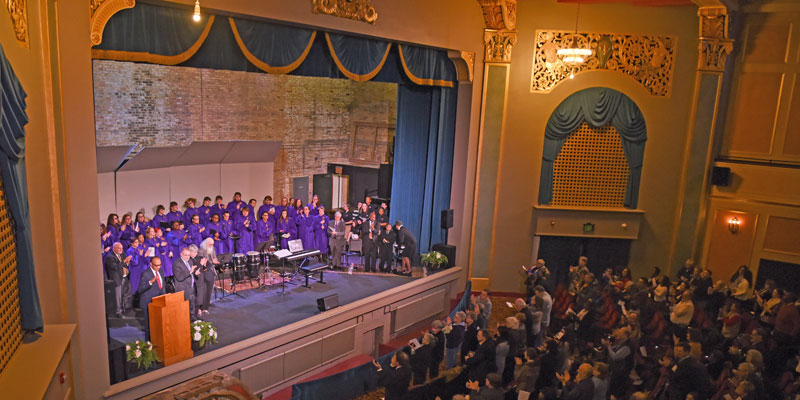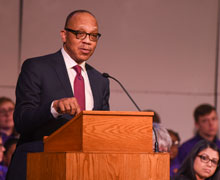Robinson at MLK Convocation: ‘Perfect Storm’ Election, ‘Wild Ride’ to Come
Related Posts
Connect With Us
February 3, 2017
By Jake Weber

Eugene Robinson (on stage, at podium) receives applause after concluding his address during the Reverend Dr. Martin Luther King, Jr. Convocation and Community Celebration at Albion’s Bohm Theatre on January 30.
Donald Trump’s presidency has impacted many things, according to Eugene Robinson, including his own job. That was one of many insights The Washington Post opinion writer and MSNBC commentator shared with a Bohm Theatre full house January 30 for the Reverend Dr. Martin Luther King, Jr. Convocation and Community Celebration.
Robinson noted that he used to spend a few days drafting his twice-weekly column, but “now that’s a total waste of time because I wake up and 15 things have happened that involve the president. I don’t start writing until two hours before deadline.”
Robinson opened his talk with a vivid description of a boyhood spent just down the block from South Carolina State University, and watching from his own living room as state police instigated what would become known as the Orangeburg Massacre. He then touched on two incidents from Election Night 2008, which he covered on MSNBC.
“We heard at 10:45 p.m. that the network was going to call the election for Obama at 11. I looked around the table and thought, ‘They’re going to go to the black guy,’ and I needed to think of something to say,” Robinson said. Nonetheless, Robinson was able to quickly call his parents with the news of the nation’s first African-American president.
“That’s something I will always remember,” said Robinson, who won a Pulitzer Prize for his Post columns addressing Obama’s first election.
“How did we get from Barack Obama to Donald Trump? I think historians will be trying to figure this out for decades,” Robinson said, launching into some of his own thoughts on the question. “It took a kind of perfect storm. Donald Trump somehow made a connection with voters who were not necessarily regular participants in the process. Sixty-two million people voted for Donald Trump and a lot of them had previously been alienated.”
“We’re in for a wild ride,” Robinson said, touching on some of the Cabinet appointments and executive orders that were announced within the first 10 days of Trump’s administration. He then noted outcomes for himself and anyone who shares his concerns.
First, “I am a journalist and I have to do my job,” Robinson said. “In some ways, this has been a good experience for the media. We have learned some lessons that we shouldn’t have forgotten. Too many people practiced ‘access journalism,’ with too much dependence on networking and befriending administration figures.

Eugene Robinson received the Pulitzer Prize for Commentary in 2009 for his columns in The Washington Post following Barack Obama’s election as the United States’ first African-American president.
“It’s a wonderful thing to remind us that it’s not our job to be friends [with politicians],” he said. “We have to hold them accountable.”
Second, Robinson hailed the swell of political protest following the inauguration, from the organized Women’s Marches to the spontaneous demonstrations in airports. The actions started by these protests “are on all of you citizens who care deeply. Get involved to participate in elections; run in elections. We can’t at this point just say what somebody should do. Somebody has to do it.”
“We have to insist on the rule of law, which our democracy is based on,” Robinson commented, noting especially the concerns about attorney general nominee Jeff Sessions and the U.S. Senator from Alabama’s perceived stance on voting rights legislation. “It is up to organizations like the NAACP and others to take legal action” when the Constitution is violated, Robinson said.
Lastly, “Either by nature or design, this administration has us all a little crazy,” Robinson said. “when all else fails, it’s OK to turn off cable TV or shut down the phone. Take a break. We need the best you to be on the front lines these days, and the best you can only happen when you’re calm and can reflect.”